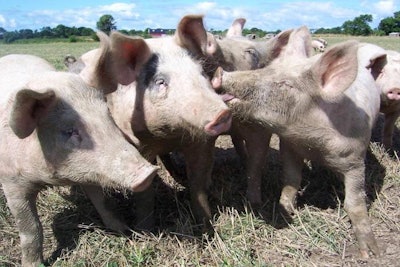
African swine fever (ASF) has made an alarming jump in Vietnam, causing the first outbreak in a centrally located province while also continuing its spread in the north. The disease has also returned to Moldova, and the virus has infected more European wild boar.
Concerned by the rapid spread of ASF in Vietnam, the United Nations’ Food and Agriculture Organization (FAO) has announced it is sending a mission to the Southeast Asian country to assess the situation and response strategy.
Not only has the virus apparently been spreading rapidly in the northern provinces since February 1, it has now jumped to a central province, bringing the country’s total areas affected to 20.
In the past week, Vietnam’s agriculture ministry has officially reported to the World Organisation for Animal Health (OIE) 73 new ASF outbreaks affecting 2,634 “village” pigs. These bring the total reported to the OIE so far to 208 outbreaks directly involving more than 10,200 animals.
Of particular concern is that the ASF virus has been detected in a small pig herd in the central province of Thua Thien-Hue, which is in the North Central Coast region. Previous outbreaks were in northern provinces in the Red River Delta, Northeast and Northwest regions. It is not known how the ASF virus was transmitted to this new area.
In its latest report dated March 15, FAO puts Vietnam’s total ASF outbreaks at 221, with more than 23,400 pigs culled.
In a report in Vietnam News, FAO’s country representative generally supported the national government’s approach and action on the current ASF situation.
Albert Lieberg urged all the country’s pig keepers — commercial producers and smallholders — to scale up biosecurity measures, particularly for those in the disease response teams.
He also warned of the potential for a national emergency if ASF were to spread out of control. There could be drastic economic consequences on 10 million Vietnamese people who depend on pigs for their food security, as well as around 1,700 commercial farms, said Lieberg.
A national steering committee has now been set up by the government to tackle the ASF situation, according to a recent Vietnam News report.
China adopts pork supply plan
Chinese authorities have not reported any new ASF outbreaks to the OIE, but the latest update from the FAO puts the country’s total number of outbreaks since August 2018 at 113, affecting 28 provinces and other regions.
With a view to stabilizing the pork supply chain in China, the agriculture ministry has adopted a new seven-point policy plan.
Among the key elements of the plan are improved monitoring and risk assessment for the disease in each region, better biosecurity measures and training in their use, more market intelligence and control, and support for more regulated commercial-scale production.
Europe: ASF returns to Moldova
Two backyard pigs that died in the autonomous territory of Gagauzia in Moldova in mid-March have tested positive for the ASF virus, according to the official report from the Republic of Moldova to the OIE.
The disease had not been detected in the country since July 2018.
ASF detected in more European wild boar
In the past week, the animal health authorities in six European states have reported to the OIE new ASF outbreaks among their respective wild boar populations. All the cases were in areas where previous outbreaks have occurred.
Reporting the most new outbreaks was Hungary (122), followed by Poland (61), Belgium (23), Latvia (2), and one each in Romania and Russia (Kaliningrad).
In its latest assessment of the ASF situation in Europe, the agriculture department in England, Defra, highlights that although the number of individual cases of the disease among wild boar has remained high in recent months, the infection does not appear to have jumped to any new areas within the region since the start of 2019.
There were 3,495 confirmed cases of ASF in wild boar in central and eastern Europe between July 1 and the end of February, according to Defra. Its report did not cover Belgium.

















